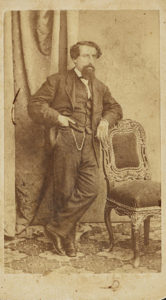
Mayer Lehman
*Mayer Lehman was born on this date in 1830. He was a white Jewish-American businessman, banker, slave owner, and philanthropist.
Mayer Lehman was born to a German-Jewish family in the small Franconian town of Rimpar near Würzburg. He was the son of a cattle merchant, Abraham Löw Lehmann. In 1850, Mayer emigrated to the United States, joining his brothers, Henry Lehman (b. 1822) and Emanuel Lehman, in the Antebellum South in Montgomery, Alabama. His brother Henry had left Germany in 1844 and opened a dry goods store named "H. Lehman." His brother Emanuel left Germany in 1847 and joined Henry in his business endeavor, which they renamed "H. Lehman and Bro." With the arrival of Mayer in 1850, it became Lehman Brothers.
In 1855, his brother Henry died from yellow fever while traveling in New Orleans. In 1858, Mayer Lehman married Babetta Newgass, the daughter of Isaac Newgass. Her sister, Esther, was married to banker Isaias W. Hellman. Together they had eight children, of which seven survived childhood. As cotton was the most important crop of the Southern United States and global demand led to a profitable business, the Lehman brothers became cotton factors, accepting cotton bales from customers as payment for their merchandise.
Cotton trading eventually became the main thrust of their business. Mayer Lehman supported the Southern cause during the American Civil War. He was listed as the owner of seven slaves ("three males and four females ranging in age from 5 to 50") in the U.S. Census of 1860. In 1864, the Governor of Alabama, Thomas H. Watts, appointed Mayer as a Commissioner to visit and look after the interests of Alabama Confederate soldiers being held as prisoners of war in the North.
Other offers of public positions were made to him, but he declined. In 1867, Mayer and Emanuel moved the company's headquarters to New York City, leaving their New Orleans cotton operation (renamed Lehman, Newgass & Co) in the hands of their brother-in-law Benjamin Newgass. They eventually built their New York operation into an important American investment bank.
In 2003, his company was the first in Chicago to formally admit to profiting from business ties to slavery, which was in operation until its September 2008 collapse. Mayer Lehman was one of the organizers of the New York Cotton Exchange, the oldest commodities exchange in New York City, and served as its director. Mayer Lehman concentrated on the business's railroad, land, industrial, and mining enterprises. He served as the director of The Hamilton Bank, The American Cotton Oil Company, The Union Oil Company of Providence, Rhode Island, and The N.K. Fairbank Company of Chicago.
Mayer Lehman took an active interest in philanthropic work and was a trustee of Temple Emanu-El and a generous giver to the Mount Sinai Hospital in New York City. He was also a member of the Harmonie Club. Mayer Lehman, one of the three founding brothers of the investment bank Lehman Brothers, died on June 21, 1897.